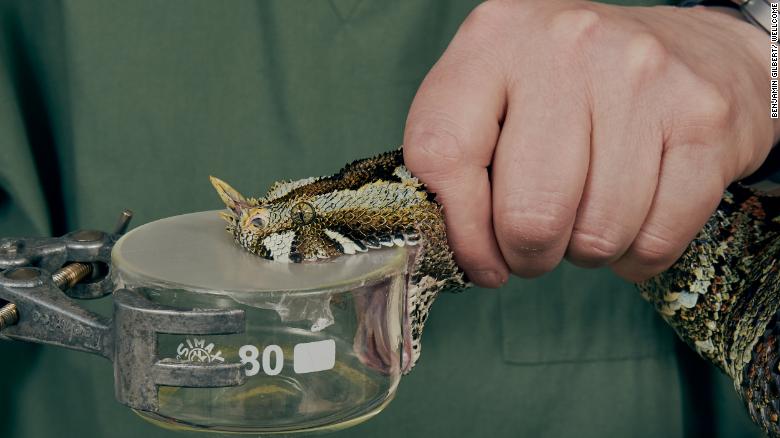Snakebites: A hidden health crisis that kills 200 people every day
Tuesday, June 4, 2019
Add Comment
Snakebites kill more than 200 people every day around the world, but Thai firefighter Pinyo Pookpinyo is one of the lucky ones.
When the tip of his thumb was bitten by the king of the cobra, he arrived in 15 minutes in the hospital of Bangkok. There he was given a serum that stopped the poison, which could be fatal because it attacked his nervous system.
"Initially, the doctor did not believe I was bitten by the king of cobras, I had to tell him that I was a teacher who taught snakes, and I was very good at identifying types.
"It hit me for about two months, so I had to go back to the hospital to do another surgery and remove the dead tissue from my thumb."
The Thai fireman Pinyo Pookpinyo was bitten by the Cobra king.
But most snakebite victims do not live close to the hospital or have any knowledge of the Pookpinyo snake. For them, a wrong place or a wrong place can be deadly at the wrong time.
Snakebite kills between 81,000 and 138,000 people and paralyzes over 400,000 every year. This is a problem compounded by the global lack of anti-snake venom, especially in sub-Saharan rural areas and Asia, where there are few suitable health facilities.
Snake bites cause more deaths and defects than other neglected tropical diseases, according to the UK's Wellcome Trust, a research organization.
"Snake bite is - or should - be a treatable condition, and access to the right antivenoms is a great opportunity for survival," said Professor Mike Turner, Scientific Director of Wellcome.
"While humans are always bitten by poisonous snakes, there's no reason why so many have to die."
Pinyo Pookpinyo has to undergo surgery to remove dead tissue after being bitten on this thumb.
This is a rating approved by the World Health Organization. On Thursday, the Global Health Agency launched a strategy to tackle the issue that activists called the world's largest hidden health crisis.
The aim is to halve death and disability from snake bites by 2030 by investing $ 136 million in public education to prevent bites, ensure more effective care and improve the health care system.
The Wellcome Trust also supports and invests 80 million pounds ($ 101.3 million) over the next seven years. This is a dramatic change in this area as Wellcome has invested just 30 million pounds ($ 38 million) over the past decade.
Antiquated treatments
Scientists believe a new approach is needed to produce safer, cheaper and more effective poisons.
The current method has changed somewhat since the 19th century: toxins are extracted from snakes and administered to horses or other animals in small doses to produce an immune response. Animal blood is removed and purified to obtain antibodies that act against toxins.
Scientists are extracting poisons from the Liverpool School of Tropical Medicine Center, the Snakebite Research and Intervention.
"It comes from horses, and injecting horse protein into humans is not without its risks, and there is a relatively high rate of side effects," said Phil Price, Wellcome's Lead Snakebite Science.
"Antigens are far from perfect, and many are not clinically tested in the same way as other medicines."
This is also a job that was not profitable for pharmaceutical companies. In 2010, Sanofi Pasteur ceased production of FAV Afrique Antigypsum, which is effective for some African snakes.
A well-researched pathway for Wellcome scientists to pursue new funding opportunities is general poison control. They will also look for alternatives to poisoning and exacerbate existing development methods.
Snakes, which are considered the biggest killers of humans, including the great vipers and Russell vipers found in Africa, the Middle East, India and Pakistan, are found in India and Southeast Asia, Price said.
Global shortage
According to Wellcome, the world has less than half of the required antigenic toxins. And poisons available in some places are often ineffective because they are not adapted to local species. Antivenoms have only been developed for about 60% of venomous snakes in the world.
This problem is very acute in Africa, where up to 90% of the antigenic toxins are considered ineffective. This can arouse people's distrust and they turn to local doctors instead of hospitals.
And when available, it can also be very expensive, plunging poor victims into a deeper plight. On average, an anti-poison bottle costs $ 160, and a full course typically requires several bottles, Wellcome said.
An 2013 study from India found that more than 40% of victims had to borrow care and families often had to sell valuables to pay for them.
"If you spend an income to pay for care, transportation and rehabilitation, there must be something - children's school books or family meals," Dr. Bernadette Abela-Ridder of the WHO Department on Neglected Tropical Diseases.
In addition to fighting toxins, WHO plans to strengthen the health, prevention and education systems to ensure that people in their communities recognize venomous snakes and can make simple behavioral changes such as wearing shoes.
Source : edition.cnn.com


0 Response to "Snakebites: A hidden health crisis that kills 200 people every day"
Post a Comment